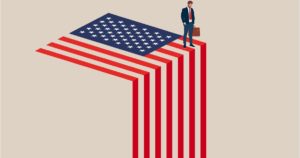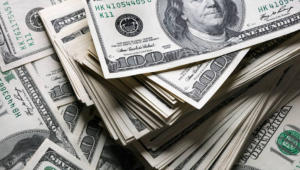In a previous essay, I pointed out that it is very likely that the US will isolate itself from the worldwide trading system due to its past—frankly unlawful—actions to steal the assets of other countries and the increasing assault on the purchasing power of the dollar. My goal was to recommend actions that the US government could adopt to reassure its trading partners that neither outright theft of assets or decline in the purchasing power of the dollar could happen. My two main recommendations were that the US readopt a gold standard and, one, move its gold to a neutral country when dollars could be exchanged for gold and, two, move the SWIFT messaging system for international trade settlement to a neutral country also.Although I believe that these actions would
Read More »Articles by Patrick Barron
Book Review: The Age of Debt Bubbles
December 10, 2024The Age of Debt Bubbles: An Analysis of Debt Crises, Asset Bubbles and Monetary Policy (2024). (ed. Max Rangeley).In this series of Professional Practice in Governance and Professional Organizations by Springer—the most prestigious academic publisher in Europe, if not the world—editor Max Rangeley has enlisted actual practitioners to explain how the “Mother of All Debt Bubbles” has been created, its danger to our financial and monetary system, and what can be done about it.This is more than a book about theory, which, no matter how logically presented, never seems to satisfy advocates of competing theories. “It’s just your theory among many.” The real novel addition is found in later chapters that provide explanations and links to sophisticated studies that show
Read More »Is increased consumer spending good for the economy?
July 29, 2024Just about every so-called business periodical touts an increase in consumer spending as “good for the economy.” But is this really so? Can we really spend our way out of a recession? Lord John Maynard Keynes thought so, and his teachings have become the standard narrative just about everywhere in the world.Probably the most influential economic treatise of all time is Keynes’ “General Theory of Employment, Interest and Money,” published in 1936 at the height of the Great Depression. Keynes theorized that the Great Depression was caused by insufficient aggregate demand, otherwise known as spending. A complementary concept is the paradox of savings, which theorized that savings is harmful because it causes aggregate demand to fall. Keynes (and
Read More »The Case for Abolishing Regulatory Agencies
May 23, 2024What is the Mises Institute?
The Mises Institute is a non-profit organization that exists to promote teaching and research in the Austrian School of economics, individual freedom, honest history, and international peace, in the tradition of Ludwig von Mises and Murray N. Rothbard. Non-political, non-partisan, and non-PC, we advocate a radical shift in the intellectual climate, away from statism and toward a private property order. We believe that our foundational ideas are of permanent value, and oppose all efforts at compromise, sellout, and amalgamation of these ideas with fashionable political, cultural, and social doctrines inimical to their spirit.
[embedded content]
Read More »The Welfare State Prolongs Recessions
March 12, 2024Many economic pundits predict that the United States and much of the world is either in a recession or about to enter one, depending upon one’s definition of the term “recession.” This brief essay is not intended to be a comprehensive explanation of what causes such economic cycles but rather the proper way to end them as quickly as possible.Disequilibrium in the Stages of ProductionA recession is merely the name for economic dislocations. The stages of production are out of equilibrium. Resources have been allocated to the wrong end products or the wrong stages of production. Consumer preferences have changed, or resources have been allocated by political factors rather than market factors. It really doesn’t matter the cause because the solution is always the
Read More »Good Logic Prevents Bad Regulation
January 2, 2024Much onerous and harmful government regulation can be prevented by the application of well-known and well-understood principles of logic. I will use the recent regulations placed upon Americans in response to the so-called pandemic. I refer to the panoply of regulations that government enacted starting in 2020 as the covid control program. Application of proper logic would have eliminated the debate over the possible effectiveness of the regulations by allowing the individual to decide for himself, without harm to others, whether or not to adopt them.
There were four main elements to the covid control program:
Mandatory vaccinesMandatory maskingMandatory social distancingMandatory business lockdowns (and the completely arbitrary division of businesses into
The Dangers of a “Cashless” Economy
November 10, 2023While the ruling elites and the Federal Reserve try to sell digital money as “modern” and “convenient,” it poses threats to financial privacy and civil liberties.
Original Article: "The Dangers of a ""Cashless"" Economy
[embedded content]
Tags: Featured,newsletter
Read More »Sound Money Is Required for Real Budget Discipline
June 15, 2023News here in the USA has been full of the latest farce known as raising or not raising the debt ceiling. After the usual dog-and-pony show, a budget deal was reached. But was it progress? It was a foregone conclusion that the debt ceiling would be raised, yet again, for the simple mathematical reason that unless the budget is cut, via spending cuts or increases in taxes, it can do nothing else.
With the budget deficit projected to be (hold on to your hat!) $1.5 TRILLION, that is a political impossibility. Notice that I used the adjective “political.” Of course, technically it isn’t impossible to balance the budget or even run a surplus. But under the current monetary regime of fiat money that can be produced in any amount at the click of a computer at the Fed,
Role Reversal: The Collapse of the Dollar-Enforced Empire
April 7, 2023The Soviet empire started to crumble around 1989. The time period between the forming of the North Atlantic Treaty Organization (NATO) in the late 1940s and the retreat of Russia from Eastern Europe with the eventual collapse of communism in Russia is known as the Cold War. There was a great power confrontation in Europe that did not result in war.
Essentially, US-led NATO stood its ground to prevent further Soviet expansion from the territory it occupied at the end of World War II and waited for the inevitable collapse. Now, perhaps not everyone saw the collapse of the Soviet empire as inevitable. But all one had to do was view the Soviet empire for oneself, up close and personal, which is what I did in the early 1970s as a young Air Force officer.
The State of
Authoritarianism Is Not Compatible with Economic Progress: Freedom Is Indivisible
December 31, 2022Is it possible, or even desirable, for economic freedom and progress to be compatible with authoritarianism? Although some may believe so, this is a fallacy. Freedom is indivisible. Political and economic freedom cannot be separated.
This is the position of Ludwig von Mises himself. In Planning for Freedom, he says, “Tyranny is the political corollary of socialism, as representative government is the political corollary of the market economy.” Regarding a citizen’s reaction to such tyranny, he writes in Planned Chaos that “If one master plan is to be substituted for the plans of each citizen, endless fighting must emerge. Those who disagree with the dictator’s plan have no other means to carry on than to defeat the despot by force of arms.” Mises contrasts the
The End of World Dollar Hegemony: Turning the USA into Weimar Germany
November 10, 2022In a recent essay, I explained how over time the US abused its responsibility to control the supply of dollars, the world’s premier reserve currency for settling international trade accounts among nations. This abrogation of its duties is leading to the likely adoption of a new reserve currency, commodity based and controlled not by one nation but by members, all watchful that the currency is not inflated.
Let us continue the analogy of an individual receiving a “magic checkbook” which allows him to write as many checks for as much money as he desires. Receivers of these checks could only pass them along to others through the normal course of trade. Over time the owner of the magic checkbook becomes increasingly irresponsible. He funds all kinds of welfare and
Sound Money Can Prevent What Representative Democracy Does Not
September 4, 2022One of the arrogances of “Western” nations is that our way of life and our liberties are protected by periodic elections as required by constitutions, written (America) or not (Great Britain), containing bills of rights, etc. The people rule, it is claimed, and we get exactly what we want, even if those in the minority are unhappy with the result. Minorities can always become tomorrow’s majority and institute alternative policies. Therefore, Western nations really cannot get into too much trouble, since everyone wants peace, freedom, and prosperity, even if we disagree on the proper route to take to get there.
But what if I told you that there was a fatal flaw embedded in the very structure of Western nations that undermined this view? What if we common citizens
Germany Can Save Itself, and Possibly the World, by Abandoning Four Failed Policies
August 14, 2022The following is a plea to Germany—the war is over and has been for three-quarters of a century. It’s time to stop prostrating yourself for the supposed “good” of Europe. It’s time to take complete control of your domestic and foreign policy, without interference from haughty, busybody world elites, and do what is best for yourself. You will be pleasantly surprised that what is good for yourself is also good for your neighbors and the world.
Here are four failed policies that must be ended:
The green energy projects.
Membership in the European Monetary Union (EMU).
Membership in the European Union.
Membership in the North Atlantic Treaty Organization (NATO) and economic sanctions against Russia.
None of these policies are working. As American humorist and
The Fed Cannot Go Bankrupt; However, It Can Bankrupt the Country
July 18, 2022A recent essay on the Mises Wire triggered quite a bit of discussion among a group of Austrian school economists. Paul H. Kupiec and Alex J. Pollock’s “Who Owns Federal Reserve Losses and How Will They Impact Monetary Policy?” became the focal point for a wide-ranging discussion of monetary issues that got to the heart of our monetary and overall economic future.
The Fed Cannot Go Bankrupt
The article itself is a fairly straightforward explanation of how the Fed works, and provides several options that the Fed might pursue in a rising interest rate environment. The authors contend that the Fed has intervened itself into a corner, where losses probably will increase as the Fed raises rates. David Howden opined that this might not happen, as the Fed will roll over
GDP Tells Us Little about the Health of an Economy
October 22, 2021The government and the mainstream media’s favorite economic statistic is gross domestic product (GDP). If GDP goes up, then the economy is doing well. If GDP shrinks, then the economy is doing poorly, or so it is assumed. It all seems so simple. But GDP tells us no such thing. The economy may be doing poorly when GDP rises. Likewise, the economy may be doing well when GDP falls. How can this be?
Although the official statistical components that make up GDP are rather complicated, the big picture is that GDP measures predominately consumer spending (for a detailed explanation of GDP’s many components, see Mark Brandly’s “Calculating GDP Correctly“). But consumer spending is not the sole use of money, and it may not be the most important.
Therefore, even in a sound
The World Needs a Gold-Backed Deutsche Mark
February 13, 2021The seeds of sound-money destruction were sown at the 1944 Bretton Woods Conference, which established that US dollars could be held as central bank reserves and were redeemable for gold by the US Treasury at thirty-five dollars an ounce. This was the so-called gold exchange standard, but only foreign central banks and some multinational organizations, such as the International Monetary Fund (IMF), enjoyed this right of redemption. The system depended upon the solemn promise by the US that it would refrain from issuing unbacked dollars. The watershed event that ushered in a new malignant, pure fiat money era occurred on August 15, 1971, when the US abandoned the gold exchange standard in order to stop the drain on the US gold stock.
American money printing had
The Hidden Link Between Fiat Money and the Increasing Appeal of Socialism
November 28, 2019What causes the seemingly unfounded confidence in socialism we encounter more and more in the news media and among political activists? In the Extinction Rebellion movement, for example, activists are quite certain they have learned that there is an alternative to markets as the means to economic prosperity. It’s a means that does not involve meeting the legitimate needs of one’s fellow men in the marketplace.
It is likely not a coincidence that most people living today have lived most of their lives in a world dominated by fiat money. It has now been nearly fifty years since the United States broke all ties between the dollar and gold. It’s been even longer since other major currencies were tied to gold at all. Consequently we now live in a world where the










